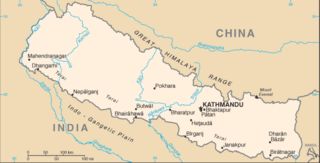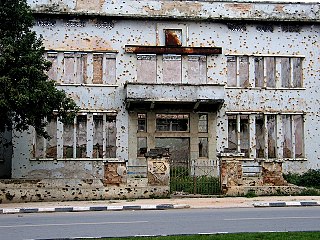
The United Nations Mission in Liberia (UNMIL) was a United Nations peacekeeping operation established in September 2003 to monitor a ceasefire agreement in Liberia following the resignation of President Charles Taylor and the conclusion of the Second Liberian Civil War (1999–2003). At its peak it consisted of up to 15,000 UN military personnel and 1,115 police officers, along with civilian political advisors and aid workers.

The United Nations Mission in Nepal or UNMIN was a special political mission in Nepal, established by the UN Security Council in January 2007 through resolution 174040 (2007) to assist in implementing key aspects of the Comprehensive Peace Agreement that ended the internal armed conflict in the South Asian country. The mandate was subsequently extended in resolutions 1796 (2008), 1825 (2008), 1864 (2009), 1879 (2009) and 1909 (2010). UNMIN ceased its operations on January 15, 2011.

United Nations Security Council Resolution 1864, adopted unanimously January 23, 2009, after recalling resolution 1740 (2007), 1796 (2008) and 1825 (2008) on the situation in Nepal, the Council extended the mandate of the United Nations Mission in Nepal (UNMIN), whose mandate expired that day, by another six months until July 23, 2009.

United Nations Security Council Resolution 1909, adopted unanimously on January 21, 2010, after recalling resolutions 1740 (2007), 1796 (2008), 1825 (2008), 1864 (2009) and 1879 (2008), the Council extended the mandate for the United Nations Mission in Nepal (UNMIN) until May 15, 2010 at the request of Nepal, deciding that it should also end on this date and further requiring UNMIN to hand over residual responsibilities including the monitoring of weapons and armed personnel.

United Nations Security Council resolution 866, adopted unanimously on 22 September 1993, after reaffirming resolutions 813 (1993) and 856 (1993), the council noted that United Nations involvement would contribute significantly to the effective implementation of the peace agreement in Liberia and went on to establish the United Nations Observer Mission in Liberia (UNOMIL).

United Nations Security Council resolution 966, adopted unanimously on 8 December 1994, after reaffirming resolutions 696 (1991), 868 (1993) and all resolutions on Angola, the Council discussed the monitoring of a ceasefire in the country and extended the mandate of the United Nations Angola Verification Mission II until 8 February 1995.

United Nations Security Council Resolution 1919, adopted unanimously on April 29, 2010, after recalling resolutions 1674 (2006), 1894 (2009) on the protection of civilians in armed conflict, 1612 (2005) and 1882 (2009) on children in armed conflict, 1502 (2003) on the protection of humanitarian and United Nations personnel, and 1325 (2000), 1820 (2008), 1888 (2009), and 1889 (2009) on women, peace, and security, the Council extended the mandate of the United Nations Mission in Sudan (UNMIS) until April 30, 2011 with the intention of renewing it further if necessary.

United Nations Security Council Resolution 1921, adopted unanimously on May 12, 2010, after recalling resolutions 1740 (2007), 1796 (2008), 1825 (2008), 1864 (2009), 1879 (2008) and 1909 (2009), the Council extended the mandate for the United Nations Mission in Nepal (UNMIN) until September 15, 2010 and stressed that arrangements should be made for the withdrawal of the mission by that date.

United Nations Security Council resolution 1206, adopted unanimously on 12 November 1998, after recalling all resolutions on the situation in Tajikistan and along the Tajik-Afghan border, the Council extended the mandate of the United Nations Mission of Observers in Tajikistan (UNMOT) for a further six months until 15 May 1999.
United Nations Security Council resolution 1230, adopted unanimously on 26 February 1999, after reaffirming resolutions 1125 (1997), 1136 (1997), 1152 (1998), 1155 (1998), 1159 (1998), 1182 (1998) and 1201 (1998) regarding the situation in the Central African Republic, the Council extended the mandate of the United Nations Mission in the Central African Republic (MINURCA) until 15 November 1999, expressing its intention to fully terminate it by that date.

United Nations Security Council resolution 1313, regarding extending the mandate of the United Nations Mission in Sierra Leone (UNAMSIL) was adopted unanimously on 4 August 2000. After recalling all previous resolutions on the situation in Sierra Leone, the Security Council extended the UNAMSIL mandate until 8 September 2000 and expressed its intention to review the mission's mandate based on recommendations.

United Nations Security Council Resolution 1933, adopted unanimously on June 30, 2010, after reaffirming resolutions 1893 (2009), 1911 (2010) and 1924 (2010) on the situation in Côte d'Ivoire and Resolution 1885 (2009) on the situation in Liberia, the Council extended the mandate of the United Nations Operation in Côte d'Ivoire (UNOCI) and supporting French forces until December 31, 2010, and expanded UNOCI's mandate with provisions to strengthen its capacity to consolidate stability in the country.
United Nations Security Council Resolution 1935, adopted unanimously on July 30, 2010, after reaffirming all previous resolutions and statements on the situation in Sudan, the Council extended the mandate of the African Union – United Nations Hybrid Operation in Darfur (UNAMID) for a further 12 months until July 31, 2011 and demanded an end to fighting and attacks on United Nations personnel and civilians.

United Nations Security Council Resolution 1939, adopted unanimously on September 15, 2010, after recalling previous resolutions on the situation in Nepal, including Resolution 1921 (2010), the Council extended the mandate of the United Nations Mission in Nepal (UNMIN) until January 15, 2011 amid concern over rising political tensions in the country.

United Nations Security Council Resolution 1727, adopted unanimously on December 15, 2006, after recalling previous resolutions on the situation in Côte d'Ivoire, the Council renewed an arms and diamond embargo on the country until October 31, 2007.
United Nations Security Council Resolution 1740 was unanimously adopted on 23 January 2007, related to situation in Nepal, at the end of the Nepalese Civil War.
United Nations Security Council Resolution 1795 was unanimously adopted on 15 January 2008.
United Nations Security Council Resolution 1796 was unanimously adopted on 23 January 2008.
United Nations Security Council Resolution 1868 was unanimously adopted on 23 March 2009.
United Nations Security Council Resolution 1825 was unanimously adopted on 23 July 2008.











